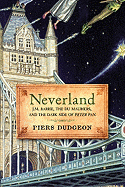
.
Focusing on J.M. Barrie's role in the eventful lives of George du Maurier, his daughter Sylvia, her five sons and George's granddaughter Daphne (daughter of Gerald du Maurier), Dudgeon found connections that made his curiosity grow. Daphne was particularly close to her cousin Peter Llewelyn Davies. He and his four brothers as children had been very, very close to J.M. Barrie: they were, in fact, the inspiration for the Lost Boys in Peter Pan. Daphne's father, Gerald, was one of Barrie's favorite actors; as a frequent visitor to Gerald's house, Barrie became exceedingly close to Daphne too. In addition to finding Barrie all-too-present in the du Maurier and Llewelyn Davies households from 1897 onward, Dudgeon was struck by the high incidence of severe depression, nervous breakdowns and suicide attempts in the families. Were they particularly predisposed to mental instability or was something else going on?
George du Maurier had been drawn to hypnosis in his youth. His novels Peter Ibbetson (1891) and Trilby (1894), which turn on psychic phenomena and post-hypnotic suggestion, caused a sensation in their day and appeared to have made an impression on J.M. Barrie. As Dudgeon notes, Barrie used Ibbetson's first name for Peter Pan, acquired a St. Bernard as another homage to the same novel and, like some besotted hero-worshipping imitator, dabbled in hypnotism, psychic phenomena and, very likely, mind control.
When Dudgeon discovers that Barrie supported the Llewelyn Davies family for many years, hosted them for summers at his country place and altered the language of Sylvia's original will after her death to make him guardian of her children, he concludes that Barrie was more than a pesky George du Maurier wannabe: he was a psychotic predator bent on controlling the family. No less than D.H. Lawrence wrote to Barrie's ex-wife after Michael Llewelyn Davies drowned (mysteriously) at 20: "J.M. Barrie has a fatal touch for those he loves. They die." Daphne du Maurier was strong enough to survive Barrie's influence, Dudgeon tells us, but many others were not so lucky.--John McFarland
Shelf Talker: Piers Dudgeon presents a literary puzzle that will provoke and enthrall fans of Daphne du Maurier and J.M. Barrie. What they learn about their idols may, however, give them nightmares.

